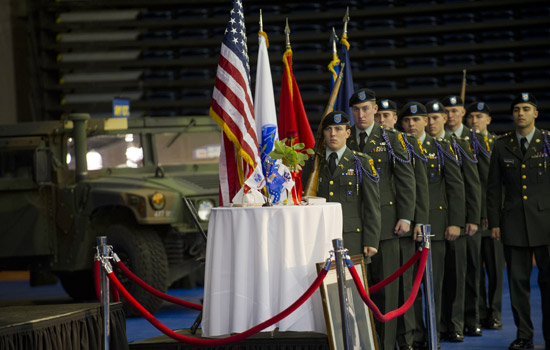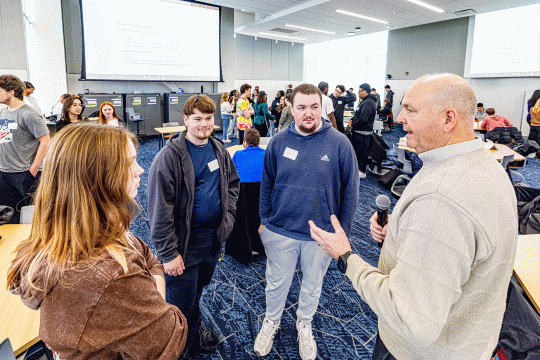RIT recognized as military-friendly school
University supports active duty personnel, veterans and ROTC cadets with multifaceted academics and services
A. Sue Weisler
For the fourth year in a row, RIT was recognized as a military-friendly school for its many services, resources and opportunities provided to military personnel. ROTC Cadets participated at the 2012 Veteran’s Day Breakfast, the annual event honoring RIT’s service men and women.
For the fourth year in a row, Rochester Institute of Technology was recognized as a military-friendly school in the 2013 Guide to Military-Friendly Colleges and Universities. The guide details U.S. colleges that consistently provide academic and financial support, foster a military culture and provide its active-duty military personnel the flexibility to serve and transition back into coursework.
RIT was recognized for its participation as a Yellow Ribbon college and for its long history of support for veterans as well as undergraduates who serve in the college’s Air Force and Army ROTC programs.
“Our veterans have made great sacrifices to serve and protect our country. Because of those sacrifices, RIT’s commitment is to remain steadfast in helping all our military personnel, veterans, and their family members achieve career success,” says Mandie Klingelhoffer, assistant director of RIT’s Graduate & Part-time Enrollment Services. She oversees the university’s Veterans and Military Enrollment Services office, which has provided resources for active-duty and veterans enrolled at RIT for nearly 50 years. More than 300 RIT students are currently receiving veterans’ benefits, one of the highest numbers in the Rochester area. Support services at RIT include benefit counseling, assistance with admission, credit transfer help, support with student financial aid, enrollment certification, tutorial support and problem/resolution advocacy.
The university was also recognized for the Military Veterans with Hearing Loss Project at RIT/NTID, established in January 2009. Veterans returning from service who experience hearing loss can earn degrees at the university and receive access support from NTID under the project.
The guide is published annually by the Military Advanced Education organization that serves education service officers and transition officers at all U.S. military installations.













